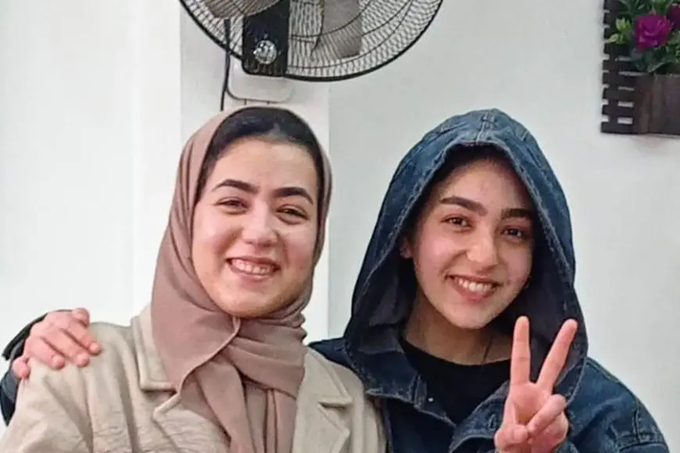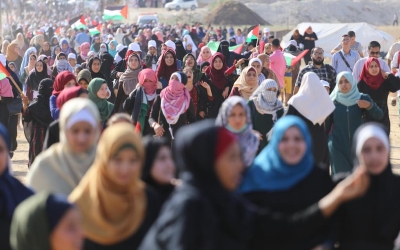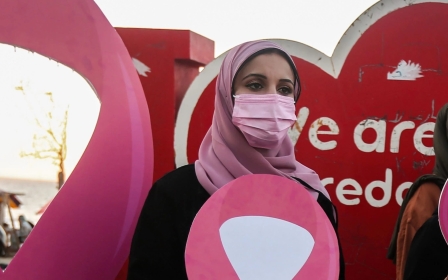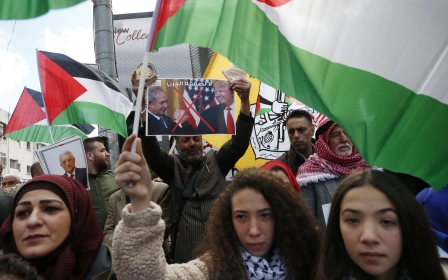Gaza: Rights groups urge authorities to help sisters locked up by father

Two Palestinian sisters in Gaza are being held against their will by their father after authorities have repeatedly failed to protect them from alleged abuse in their home, rights groups have said.
Over the past six months, Wissam al-Tawil, 24, and her sister, Fatma, 19, twice attempted to escape their home, reporting their abuse to local police and speaking out on social media.
Their father allegedly interrogated, beat and confined them, including for a 35-day period when they were locked in rooms, given one meal a day and only allowed to use the toilet twice a day.
On the both times they fled, they were forcibly returned to their father.
As public attention on their case has grown, the interior ministry described the situation as a family dispute. Meanwhile, their father told a Facebook Live audience that it was nobody’s business if he killed his own daughters and he would only receive a six-month jail sentence if he did.
New MEE newsletter: Jerusalem Dispatch
Sign up to get the latest insights and analysis on Israel-Palestine, alongside Turkey Unpacked and other MEE newsletters
Now rights groups say the sisters have been locked on the sixth floor of an apartment building in Rafah since early January and have called on authorities in the Israeli-besieged enclave governed by Hamas to take swift action.
“Hamas authorities in Gaza should urgently ensure the two women’s safety and freedom of movement, including that they are able to leave their father’s home to a safe place of their choosing, and speak freely and independently about their situation," said Rothna Begum, senior women's rights researcher at Human Rights Watch.
Reached for comment this week, senior Hamas leader and deputy minister of social development Ghazi Hamad acknowledged that authorities had forcibly returned the sisters, but said he couldn't understand why their story is still in the news.
"The girls are back at their father's house, and we made sure they are fine and safe there," he told Middle East Eye.
Failed escapes
After enduring abuse since 2019, the Tawil sisters first attempted to escape from their father in August 2022, according to HRW and Amnesty International, which have documented the details reported here.
That month, Wissam said her father locked her up for seven days. Fatma immediately called the police, but they took a week to come to the house and left without taking action.
'The simple truth is that we are two abused girls who broke our chains by jumping from the sixth floor to the fifth, just to survive'
- Wissam al-Tawil
About 10 days later, the father allegedly told his daughters that they would “definitely die” and asked them to choose “the easiest way”. He then locked them on the sixth floor of their building with a gas canister and encouraged them to kill themselves.
The sisters escaped, as Wissam later explained, holding on to a curtain to jump to the fifth-floor balcony, and fled to a shelter.
“The simple truth,” Wissam wrote in a piece published on the Raseef22 website last month, “is that we are two abused girls who broke our chains by jumping from the sixth floor to the fifth, just to survive.”
They went to the Hayat Centre for Protecting and Empowering Women, a shelter operated by a non-governmental organisation, and gave detailed accounts of their abuse to the authorities.
Three days later, community police, the sisters, and their uncle, among others, gathered to discuss “the social problem between the father and his daughters”, an interior ministry reported in a press release.
Feeling under pressure and promised by their uncle that he would not hand them back to their father, the women agreed to leave the shelter.
But on 6 September, their father - who lives in the same building as the uncle - severely beat and threatened to kill them, forcing them back to his apartment.
'We are doomed'
Two days later, the sisters escaped once again. They went to the police to report the abuse, reportedly showing the physical marks of their beatings as well as photos of weapons their father had inside the house.
A second interior ministry press release that day said authorities were “surprised” that the women had left their family home again and that they had been provided with temporary shelter in a government facility because the family were “unable to control the dispute”.
But on 12 November, police officers forced the sisters to leave the facility and sent them to a relative’s home, where Wissam said they were locked in a room for 48 hours. Fearing they would be returned once again to their father, they went into hiding.
On 5 January, after their father and other relatives had reported them as missing, the sisters were arrested and handed over to a relative who drove them to their father’s home.
“We are at our father’s house; he will send us over to the sixth floor in a bit. We are doomed,” one of the sisters told Amnesty International in a message sent in the middle of the night.
Since then, the rights groups say they have not heard from the sisters. On 3 February, photos were posted on social media by their father showing the women smiling while sitting with their relatives at their house.
Hamad, the senior Hamas leader and deputy minister of social development, said the photos proved that there was no threat to the sisters' lives.
However, a relative has told HRW that aside from that visit, the women remain confined on the sixth floor.
“Pictures of two women with their family a month after the police in Gaza tracked them down and forcibly returned them to their family, who they previously fled from after reporting severe domestic violence, including death threats, is not enough to assure the world that they are free, safe and their lives are no longer at risk,” said HRW's Begum.
Under pressure
Those following the case said the father has rallied the community around him to harass anyone who has helped the women and pressure them to hand them back.
Tahani Qassim, a supervisor at the Hayat Centre, which temporarily housed the women, told MEE that their organisation came under attack from the father and his supporters.
“At the centre, we do our best to support oppressed women and empower them, not to separate them from their families,” she said. “We tried to do this with Fatma and Wissam, but we don’t know what has happened after they left our centre.”
'Home can be the most dangerous place for women when it’s turned to a jail'
- Supporter of the sisters
Meanwhile, Begum said: “The father isn’t only abusing his daughters, he is also harassing everyone who gets involved to protect the girls, including women’s rights groups.”
She added that her organisation had privately reached out to authorities in Gaza several times and called on them to protect the women.
“They apparently failed to do so which is clear from the girls’ public statements,” Begum said.
The authorities, she said, are prioritising family reconciliation over the sisters’ lives “even while [they] are reportedly subjected to violence, denied the right of mobility and threatened with weapons by their father”.
“Hamas always wanted to end the case by sending the girls back home, even when they stayed at its safe house; they were forced to leave it and go to their oppressor,” she added.
Many women have turned to social media in recent years as a way to seek help against abusers, but this is the first time in Gaza a case of domestic violence against women has been in the public eye.
The sisters have received significant local support, particularly from women, through posting on social media accounts. Their supporters say they are concerned that, despite all this, their lives remain at risk.
One supporter on Twitter wrote earlier this month: “It hurts to know they will possibly be killed. Home can be the most dangerous place for women when it’s turned to a jail."
Middle East Eye delivers independent and unrivalled coverage and analysis of the Middle East, North Africa and beyond. To learn more about republishing this content and the associated fees, please fill out this form. More about MEE can be found here.





